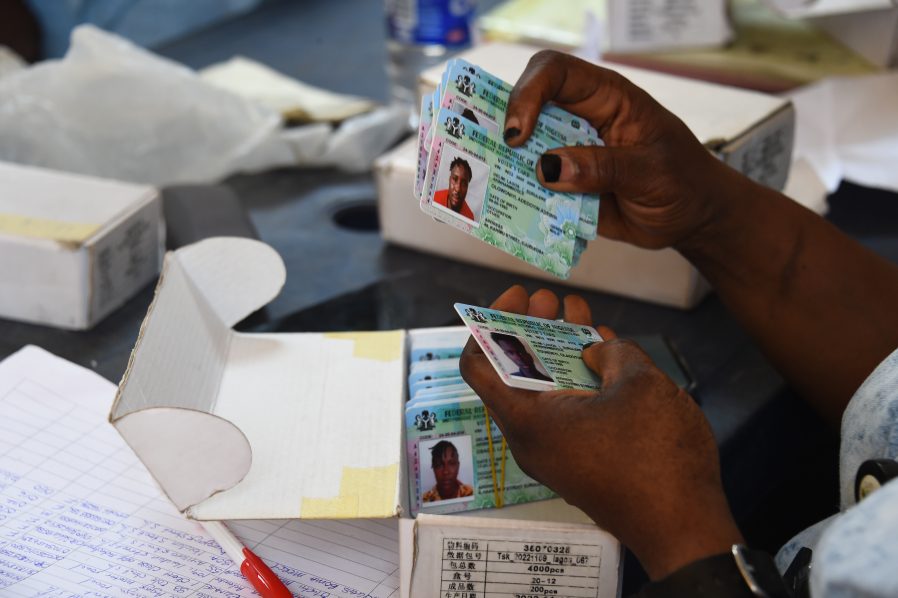
‘How Commission will handle identify theft on election day’
Independent National Electoral Commission (INEC) has denied alleged ethnic profiling of voters in the distribution of Permanent Voter Card (PVCs) in some parts of the country.
The Commission described reports that its officials refused to give PVCs to registered voters belonging to a particular ethnic group as false. Chief Press Secretary, Rotimi Oyekanmi, disclosed this in a chat with reporters covering INEC, yesterday.
Oyekanmi was reacting to videos and claims by some registered voters in Lagos, who accused INEC staff of colluding with politicians, allegedly belonging to the ruling All Progressives Congress (APC), to deny them their PVCs.
Maintaining that the story is false, he said the Commission had initially delivered 940,200 PVCs to Lagos for new registrants. According to him, as of January 26, 2023, 839,720 PVCs (representing 89.3 per cent) had been collected. He said additional PVCs were also delivered to Lagos, recently, and owners have been collecting them.
“Is it really possible that Igbo will not be among these 839,720 persons? I am saying this because the allegation you referred to is not just from our Oshodi office. We hear about it at other local councils,” he said.
Oyekanmi observed that the issue came up recently when a professor of Political Economy, Pat Utomi, visited the Commission’s Oshodi office based on the same allegation, and addressed a press conference there, which he (Oyekanmi) said was totally unexpected of someone in his position.
He said: “Seun Okinbaloye of Channels asked our Lagos Resident Electoral Commission (REC) about it. His response was that many of those complaining about not getting their PVCs actually registered twice. They moved from their former residence/state and would like to vote in Lagos.
“There is nothing wrong with that. However, instead of applying for a transfer of their polling unit (from where they relocated to Lagos), they went ahead and registered a second time, which is against our laws.
“Our policy is not to print PVCs for double registrants, because his/her card would have been printed already and will be among the uncollected PVCs.
“Let me emphasise this: If they had applied for a transfer, which is the right thing to do, our system would have treated their application on its merit. But by registering twice, which is an infraction, our system will not allow their attempt to get a second PVC.
“So, this is not about withholding PVCs belonging to a particular ethnic group. To me, it is an impractical thing to do. We have Igbo among our Lagos office staff (in senior positions) and you cannot discriminate against any ethic group if you want to succeed as an organisation.”
MEANWHILE, INEC has explained that its Bimodal Voter Accreditation System (BVAS) won’t allow identify theft during elections. National Commissioner and Chairman (Information and Voter Education Committee), Festus Okoye, said this, yesterday, in a chat with reporters.
His response followed non-validation of the PVC of a registrant in Imo State during Saturday’s BVAS mock accreditation exercise in designated polling units across the country.
“The lady in question was fair complexioned. The picture captured during registration was that of a dark complexioned lady. No one could identify her with the picture. No one could identify the person on the register. The BVAS could not identify her 10 fingers.
“Someone registered for her. So, there was the possibility that the name belonged to her but the fingerprints and image on the BVAS belonged to another individual. All the observers agreed that she was not truthful. That is the power of the BVAS. Identify theft will not be allowed,” Okoye said.
When it was pointed out that the lady in question was at her polling unit, Okoye said she was truly there because the name was on the register and the details were in the BVAS, insisting that the BVAS was introduced to prevent identity theft.
Asked the immediate measures in place to arrest and prosecute persons found to have committed identity theft, he responded that on election day, INEC would deploy four ad-hoc staff to the polling unit consisting of the Presiding Officer and Assistant Presiding Officers One, Two and Three.
He said they would be joined at the polling unit by unarmed security agents. According to him, “the outer cordon may be manned by armed security agents and, alternatively, the security agents may be patrolling. Sometimes, we have tense situation in polling units and sometimes the situation may be difficult to control.
“Some units are in difficult terrain. Some of them are in remote areas. Some of the units are in places that are not easily accessible. Some of the Presiding Officers would be struggling to control the crowd.
“Some of the security agents may be in a school, with so many polling units and so many registered voters. The rational and reasonable thing to do in the circumstance is to advise the individual (suspected of identity theft) to exit the polling unit.
“The attention of the security agents would be drawn if such an individual becomes disruptive. In such circumstance, the security agents would device strategies for taking the individual into custody for possible prosecution.
“The Commission will not want a situation of complete breakdown of law and order in a polling unit. Each situation will be handled based on the specific issue at the unit.”



